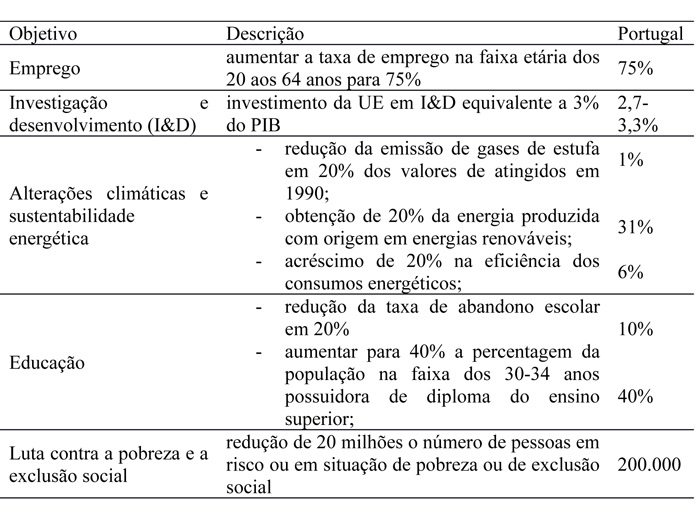 The objectives of the European Union (EU) for the period 2014 to 2020 are globally defined, interconnecting and mutually reinforcing, being common to all countries of the Union with different contributions.
The objectives of the European Union (EU) for the period 2014 to 2020 are globally defined, interconnecting and mutually reinforcing, being common to all countries of the Union with different contributions.
There are 5 major strategic goals for 2020:
To help meet the agreed objectives, the EU continues to provide financial assistance through the structural funds, ERDF-European Regional Development Fund, ESF-European Social Fund, Cohesion Fund, EAFRD-European Agricultural Fund for Rural Development and FEAMP-Fund European Union for Maritime Affairs and Fisheries.
Of note was the creation of an innovative form of execution, called ITI – Integrated Territorial Investment, which allows for the first time the joint use of different structural funds for the same project in urban areas.
The aim is to promote integrated policies that will enable sustainable urban development.
For the Algarve region, the role of Tourism sees its important position recognized with the inclusion of the two largest sectoral associations, AHETA and AIHSA, in the working group that defines the PAR-Regional Action Plan in March 2013, the document it intends to to be the platform for coordinating the tasks to be carried out in the 2014-2020 period, considered necessary for the aforementioned sustainable development.
Tourism in the Algarve, no longer being the traditional Sun and Beach product, faces competition from destinations on the edge of the Mediterranean that have similar resources, requiring the creation/discovery of what Perna et all (2012) call “Resources “beyond” tourism”, which clearly includes the cultural and creative sectors.
The European Union, through the Creative Europe 2014-2020 Programme, considers that the cultural and creative sectors represent Europe's immensely diversified and rich cultural heritage, also contributing to the development of our societies, and to the generation and growth of jobs, providing for this is more than €1,4 billion over the next seven years.
On the 21st of January, those responsible for Tourism and Culture in the Algarve gave a clear signal that they do not wish to pass up this opportunity by promoting a working meeting to define lines of action together, thus giving substance to Action 6 of the Specialization Intelligent proposed by Ramos A. (2012) slide 14, “Developing animation and cultural heritage”.
Author Jose Alberto Mendes
Economist
REFERENCES
>>European Commission (2013) Europe 2020 Strategy Objectives, online http://ec.europa.eu/europe2020/europe-2020-in-a-nutshell/targets/index_pt.htm, last access 10-02-2014.
>>QREN Observatory (2013), The European Commission presents a new architecture for Cohesion Policy 2014-2020, online, http://www.observatorio.pt/destaque.php?lang=0&id_channel=19&id_page=655, last access 10-02-2014.
>>Leg, F., Custodio, MJ, Gouveia, P., Oliveira, V. (2012) Study on the Competitiveness of Tourism in the Algarve, Algarve Regional Coordination and Development Commission, Faro, online, http://poalgarve21.ccdr-alg.pt/site/sites/poalgarve21.ccdr-alg.pt/files/2014-2020/ficheiro_29_present_fperna_ccdra_10abr2013.pdf, last access 10-02-2014.
>>Ramos, A. (2012) Smart Specialization Strategy in Europe 2020 Strategy Seminar, CCDR, online https://www.fct.pt/esp_inteligente/docs/Workshop_11122012_AntonioRamos.pdf , last access 10-02-2014.
NOTE: Article published under the established protocol between the Sul Informação and the Algarve Regional Delegation of Order of Economists.



















Comments